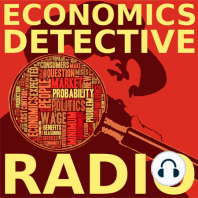51 min listen

Marx, his Errors, and his Continuing Influence with Phil Magness
Marx, his Errors, and his Continuing Influence with Phil Magness
ratings:
Length:
40 minutes
Released:
Sep 9, 2016
Format:
Podcast episode
Description
This week's episode of Economics Detective Radio deals with the economic thought and continuing popularity of Marx. No, not Groucho! The other Marx! My guest on the podcast is Phil Magness, a historian who teaches at George Mason University. Phil recently wrote a piece entitled, "Commie Chic and Quantifying Marx on the Syllabus." Recently, the Open Syllabus Project released a data set including thousands of college syllabi. To many people's surprise, Marx and Engels' Communist Manifesto enjoys massive popularity! Phil took a closer look at the numbers and reached some startling conclusions: 1. Accounting for different versions of its title, Marx’s Communist Manifesto appears on a total of 3856 syllabi in the Open Syllabus Project database. That makes it the second most used text in academia after the popular writing style manual by Strunk and White (3934 syllabi) – a book that’s usually assigned to help college students with their composition habits for writing term papers. 2. Of those 3856 Communist Manifesto hits, only 103 – or 2.67% – are on syllabi in Marx’s own primary academic discipline, economics. The rest are in fields that venture far astray from economics, with the highest concentrations coming from the humanities. 3. Marx’s Communist Manifesto far exceeds the syllabus frequency of virtually *any* other author or work in all of human history with the possible exception of Plato. Here are the rankings for Marx and the most cited work of several major philosophical figures on the list (note: I intentionally excluded works that are textbooks or primarily literary and paired down the tail end of the list to give a rough sample): Marx (Communist Manifesto) – 3856 Plato (Republic) – 3573 Aristotle (Ethics) – 2709 Hobbes (Leviathan) – 2671 Machiavelli (The Prince) – 2652 King (Letter from the Birmingham Jail) – 1985 Mill (On Liberty) – 1969 Foucault (Power) – 1774 Darwin (Origin of Species) – 1701 Augustine (Confessions) – 1694 Tocqueville (Democracy in America) – 1650 Smith (Wealth of Nations) – 1587 Rousseau (Social Contract) – 1427 Rawls (Theory of Justice) – 1248 Sartre (Existentialism) – 1224 Paine (Common Sense) – 1128 Locke (Second Treatise) – 1045 What could account for the popularity of The Communist Manifesto? Phil identifies two hypotheses: First, it could be the case that Marx simply is the most important thinker who has ever lived, beating out all but Plato by a wide margin. Second, Marx could be enjoying outsized popularity because university faculty outside of economics are overly enamoured with his thought. The latter seems like the truth. While Marxian thought does dominate some corners of philosophy, history, literary criticism, and many other subfields, we would expect classes in those areas not to focus on The Communist Manifesto but on Marx's other works. Das Kapital is in 1447 syllabi, right around Rousseau's Social Contract. The Communist Manifesto is a political leaflet, not a work of deep scholarship. The fact that it dominates not only the works of other thinkers but also Marx's other works indicates that it is assigned primarily for its political conclusions. How has Marx Avoided the Dustbin of History? Marx' economic thought was rejected by economists even within his own lifetime. All of his economic analysis shared a fatal flaw: the labour theory of value. Marx observed that capitalists earn profits above the wages paid to workers. In his framework, this would only be possible if the capitalists exploited the workers. This was met with an empirical challenge: If profits are the result of exploitation, how come profit rates aren't highest in capital-intensive industries? Instead they are relatively consistent across the entire economy. Engels claimed that Marx would resolve this issue in the later volumes of Kapital. He even held a Prize Essay Competition to see if anyone could anticipate Marx' solution to this seemingly intractable problem. But the later volumes didn't offer a satisfactory so
Released:
Sep 9, 2016
Format:
Podcast episode
Titles in the series (100)
Trailer Parks, Zoning, and Market Urbanism with Nolan Gray: Today's guest on Economics Detective Radio is Nolan Gray. Nolan is a writer for Market Urbanism and the host of the recently launched Market Urbanism Podcast. Market urbanism is the synthesis of classical liberal economics and an appreciation for... by Economics Detective Radio